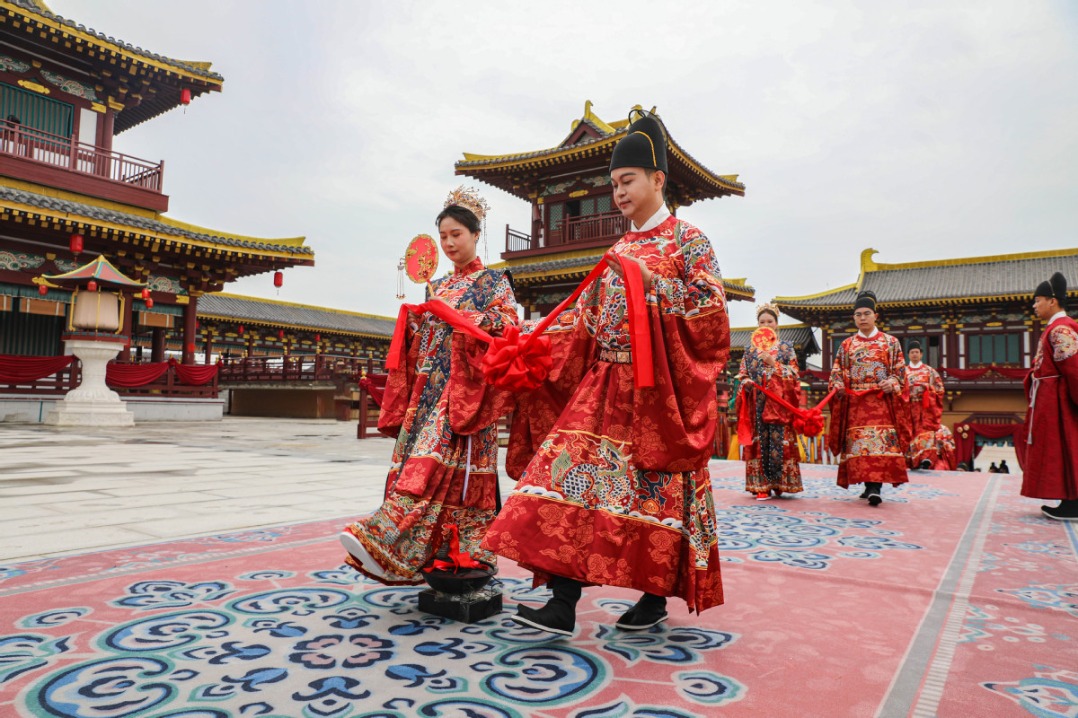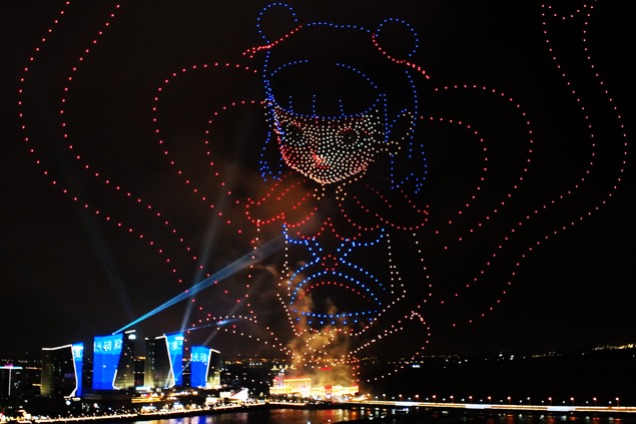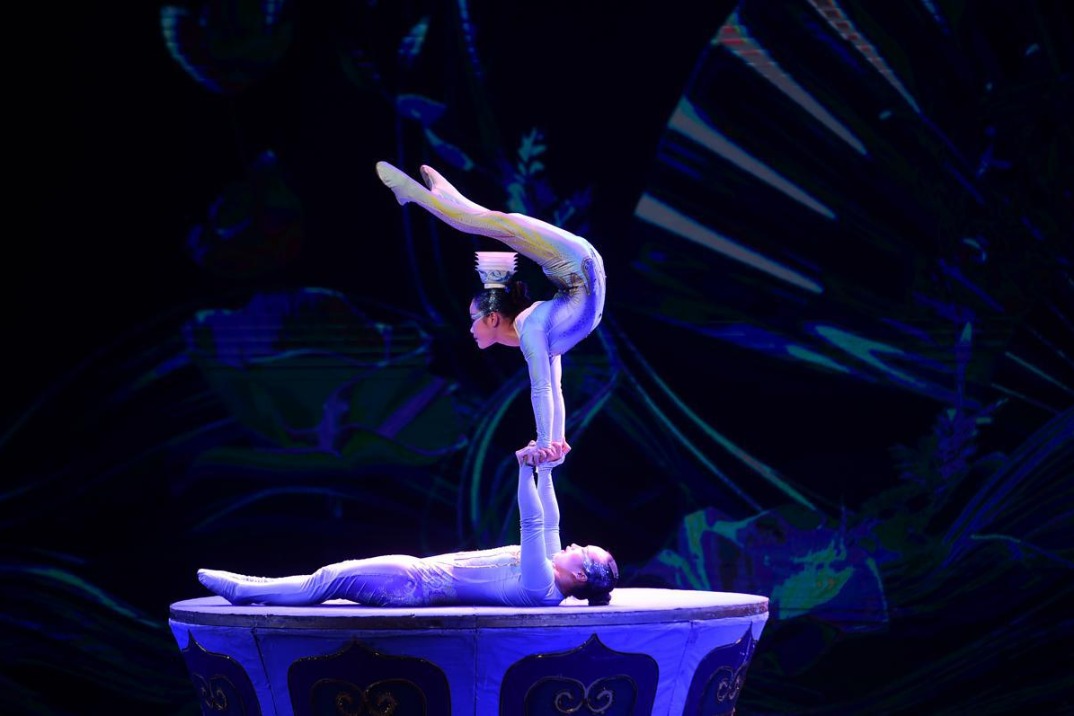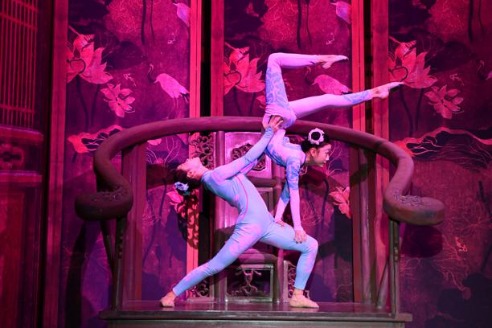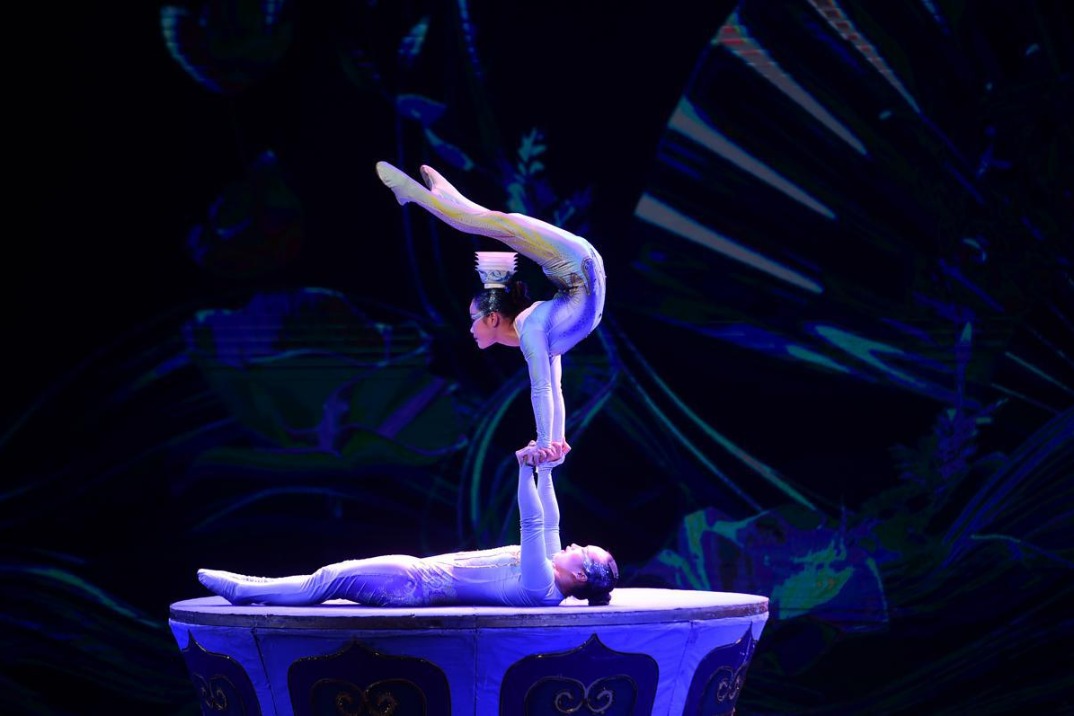Students sing praises of war heroes
New school year starts with patriotic performances celebrating 80 years since end of WWII

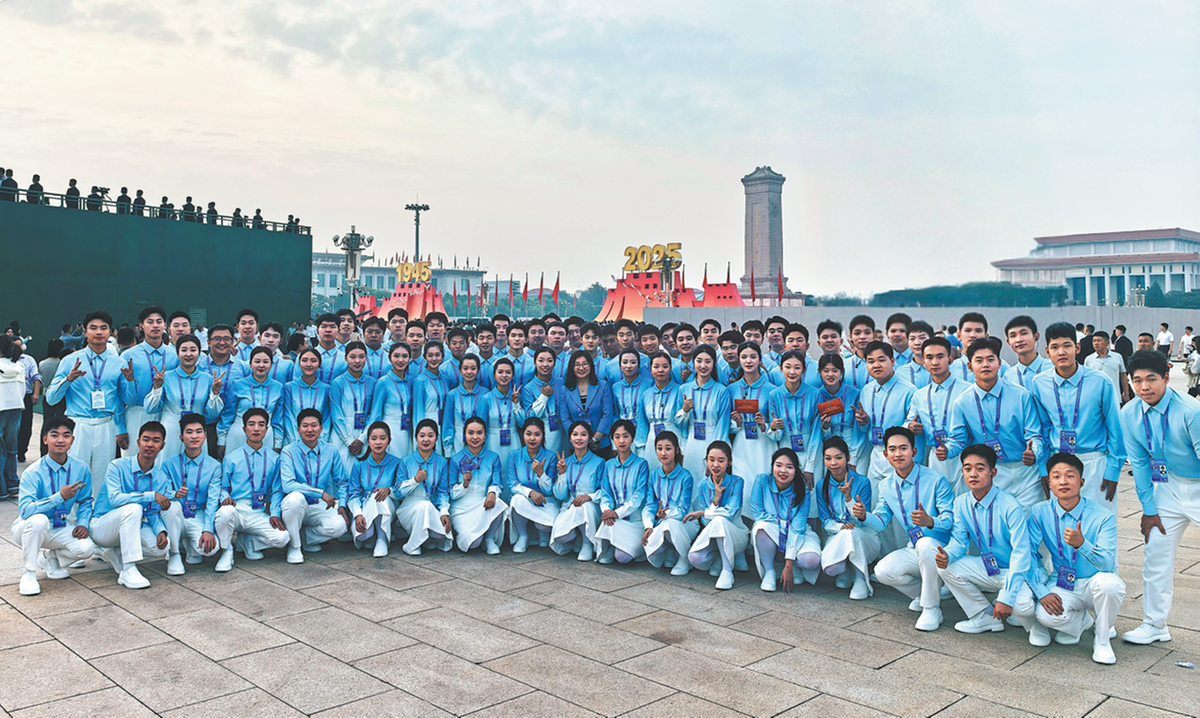
When Sun Yuxuan, a doctoral student from the School of Transportation Science and Engineering at Beihang University in Beijing, stood before thousands of freshmen at the school's opening ceremony in early September and sang On the Songhua River, he was channeling history.
The folk ballad recalls the suffering and resilience of Northeast China during the Chinese People's War of Resistance Against Japanese Aggression (1931-45).
His performance, part of a broader national commemoration of the 80th anniversary of the victory in the Chinese People's War of Resistance Against Japanese Aggression and the World Anti-Fascist War, resonated deeply.
"My hometown is on the Songhua River in the northeast, where there are forests and coal mines, and soybeans and sorghum across mountains and fields," he sang with deep emotion.
A video of his singing became very popular online, amassing over 3 million views.
"This song carries the historical memory of my hometown and embodies the national spirit," said Sun, who is from Jilin city in Jilin province. "It's not just a melody — it's an emotional bridge to the past."
With the 80th anniversary of the end of the war coinciding with the new school year, opening ceremonies have featured performances celebrating the great struggle and China's ultimate victory.
In classrooms, auditoriums and galleries nationwide, the new academic year began not only with new knowledge, but with old memories — memories of a war that changed the world, and a spirit that continues to shape China's future.
Sun was also a member of the mass choir that performed at the grand parade held in Beijing on Sept 3. Rehearsing through scorching summer days and chilly rainy nights, he and fellow choir members began to embody the very perseverance they sang about.
During evening rehearsals that stretched late into the night, they worked tirelessly under the stars — an effort he described as "practicing by starlight and moonlight".
"Through our persistence, we hope to prove to the predecessors who fought in the war of resistance that our young generation is capable and responsible," Sun said.
Many may think Red songs are a thing of the past, and that they may not sound as diverse as modern music, he said. But the reason these songs have stood the test of time is that they carry profound historical meaning and deep emotion. Singing Red songs is not just about the melody — it's about telling the stories behind them and passing on their spiritual strength, he said.
Under ordinary circumstances, people might not feel it deeply. But when you truly immerse yourself in the moment — whether at a grand event held at Tian'anmen Square or watching on television — they will be moved, he said. "As Chinese people, when we listen with a heart full of love for our country, we can understand why these melodies remain timeless."
This spirit of perseverance was echoed on university campuses across the country. At Renmin University of China in Beijing, the opening ceremony held in late August served as a profound historical tribute.
Zhang Donggang, the university's Party secretary, welcomed students by underscoring the institution's origins in the revolutionary flames of the war of resistance.
He said RUC is a university that marches courageously on the journey toward national rejuvenation, one that inherits a glorious revolutionary tradition and flows with distinct Red genes, as well as being the first university founded by the Communist Party of China.
He urged the class of 2025 to uphold the spirit of the Shaanbei Public School — the predecessor of the university — and embrace the core values of loyalty that reassure the Party, dedication that serves the people, truth-seeking through practical action, and pioneering through tireless endeavor.
A particularly moving moment came when Chen Hong, a descendant of war martyr Zhao Yiman, appeared alongside a digital avatar of her grandmother to revisit the spirit of the war years in letters.
Chen shared excerpts from her grandmother's family letter, noting that her father — the first student enrolled in the university's diplomacy department — had handwritten a copy of the letter for her.
Chen shared: "Dear student, always remember the arduous years of the war of resistance. Remember those who fought for national survival, for rejuvenation, and for human justice."
She encouraged students to draw strength from the deeds of heroes and grow into pillars capable of shouldering the great task of national rejuvenation.
For Li Zhixuan, an undergraduate student at the university's business school and a former soldier, the ceremony carried deep personal resonance.
"In the army, I learned responsibility and commitment. Today, hearing stories of heroes like Zhao Yiman, I understand that retiring from service doesn't mean retiring from spirit," Li said.
"The war spirit, for me, is the drive to push through academic challenges, to step up as a student leader when tired, and to hold firm in my beliefs."
Another freshman, Yu Ziran from the university's School of Public Administration, was raised on family stories of the war.
His great-grandparents and grandfather were Party members, and tales of heroic war heroes were his childhood bedtime stories. "The seeds of history were planted in me long ago," Yu said.
"Today, at Renmin University, they are reawakening."
At Nanchang University in Jiangxi province, some 3,700 freshmen gathered in the indoor stadium to watch the live broadcast of the Sept 3 commemoration in Beijing.
Among them was Liu Zhen, a postgraduate student in Marxist studies, who had proactively asked his teacher to organize a collective viewing session for his class. "In the resonance, in the veterans' firm gazes, and in the steady march of the People's Liberation Army, I saw the great spirit of the war of resistance," Liu said.
Since arriving to study six years ago, Liu has visited all the major sites of the important revolutionary heartland such as the Nanchang August 1 Uprising Memorial Hall. He got to know how the People's Liberation Army emerged from Jiangxi.
Last August, he became a volunteer teacher in Guizhou province. There, he took students to cinemas, cultural centers and martyrs' cemeteries, sharing stories of revolutionary heroes. In June, he led 29 students from Guizhou to Nanchang to revisit the memorial hall. "I want to pass on the Red spirit to the next generation," he said.
"I will study hard, spread these Red stories, and turn patriotic will into action."
At the Communication University of China, the commemoration of the end of the war took a powerful visual form through an art exhibition, which featured 124 works, including 100 traditional Chinese paintings by doctoral students and 24 oil paintings by Russian artists.
Liao Xiangzhong, the university's Party secretary, framed the exhibition as both an artistic and political endeavor — a "comprehensive exam" evaluating students' political awareness and artistic skill.
The event has shown that students have integrated their artistic pursuits into national cultural development, Liao said.
"These works demonstrate the doctoral students' firm political conviction, deep national sentiment, and strong sense of mission," he added.
Doctoral student Lu Ming presented two ink paintings: Black Mountains, White Waters — Yang Jingyu and Black Mountains, White Waters — Zhou Baozhong, portraying two legendary commanders of the northeast army unit.
Lu depicted General Yang in a critical charge scene, holding a pistol, eyes filled with determination and belief, contrasting the intensity of the combat with the commander's calm decisiveness. For General Zhou, Lu set the scene in a snowy birch forest, highlighting both the harsh environment and the resilience of the troops. "I used gray tones to portray skin, reflecting both the bitter cold and the harshness of the struggle," he explained.
The exhibition not only guides viewers to remember history and honor the martyrs, but also inspires patriotism on a spiritual level, providing robust support for inheriting the Chinese nation's spiritual lineage and promoting cultural development in the new era, he said.
Ding Zhe, another doctoral candidate, described her work White Mountains, Black Waters, Casting Loyal Souls as a "spiritual dialogue "with the past. "Art is how we refuse to forget," she said. "Through ink, I tried to reconstruct the spiritual aura of the land — the steadfastness of the mountains, the vastness of the snow. Behind those simple brushstrokes lie countless unknown heroes who protected the motherland with their lives."
Art is also a universal language for conveying the message of peace to the world. It transcends borders and cultures, directly speaking to the human heart, she said. "Through such creative expression, we are not only looking back at the past but also making a forward-looking statement: May courage be passed down, may sacrifice be remembered, and may peace become a shared vision for the global village."
zoushuo@chinadaily.com.cn
- Couples celebrate traditional Chinese group wedding in Shandong
- China takes to road on first day of national holiday
- China deploys patrols on water, in air around Huangyan Island
- Macao SAR celebrates National Day with flag-raising, reception
- China to expand its participatory law-making process
- World's largest-capacity centrifuge goes into operation in Hangzhou
















